


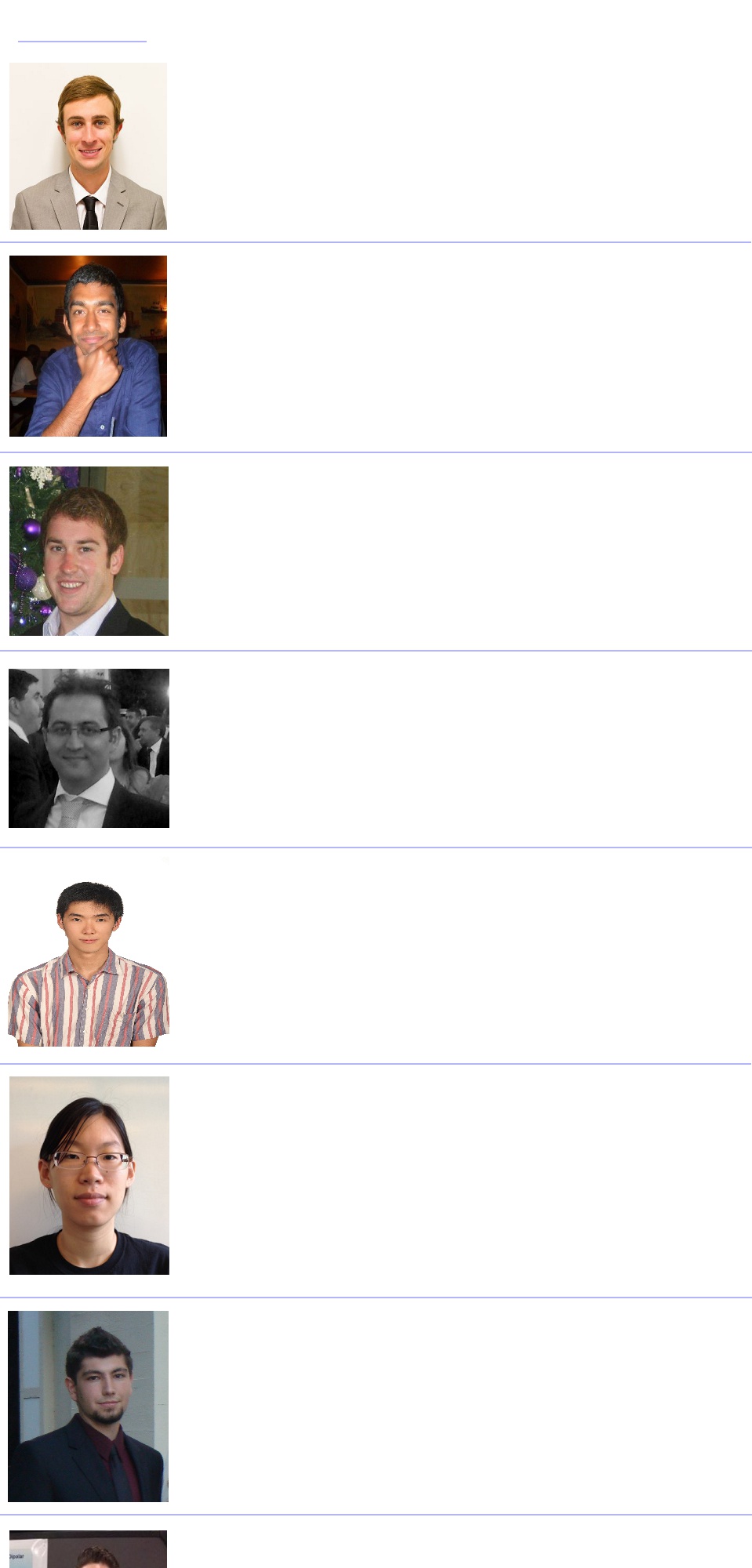

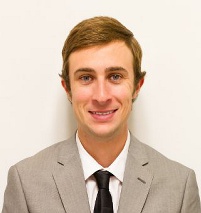

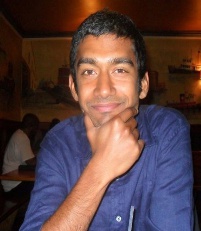

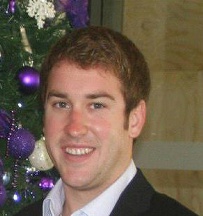

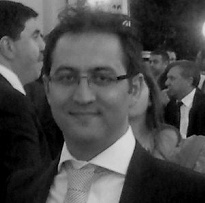

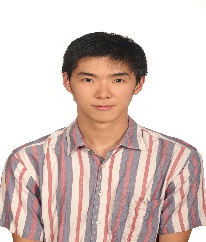



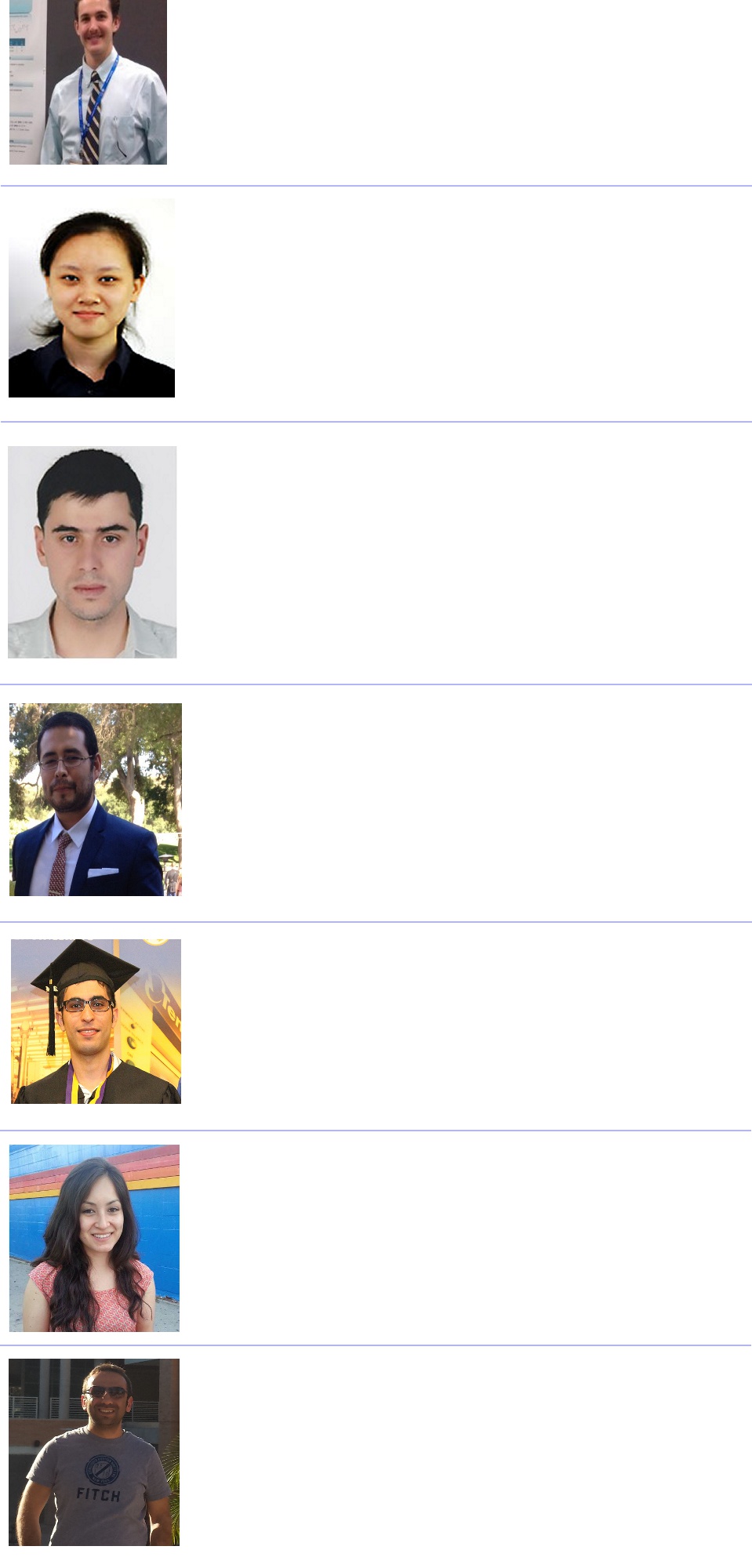
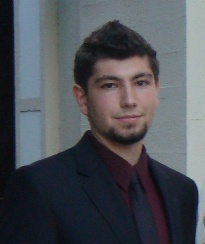



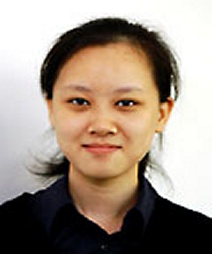


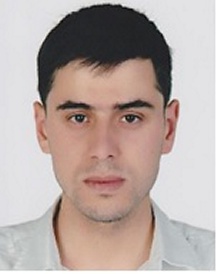

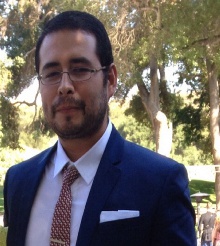

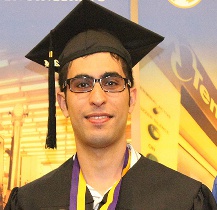



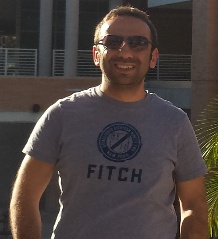
Members
I am working on synthesizing bi-functional catalysts for Li-air battery. The high cost of cathode materials
and low efficiency hinder the development of Li-air battery. Therefore, cheap and highly efficient
catalysts for both oxygen reduction (ORR) and evolution reactions (OER) are indispensable. I am trying
to utilize solution based methods to synthesize Mn oxides, which are potential catalysts for both ORR
and OER. The methods can be scaled up without efforts with low cost as well.
Brennan graduated from Cal State Bakersfield with a B.S. in Chemistry, and has industry experience working
for Multi-Chem, a division of Halliburton, as an analytical chemist and field chemical solution expert. His
research focus is on energy storage, and uses chemical techniques for battery and supercapacitor synthesis. His
interests include novel nanomaterials for high energy density batteries such as lithium-sulfur batteries, and
bio-inspired design of electrode materials for specific capacity optimization. Currently, he is working on two
novel lithium-sulfur cathode materials, and hopes to begin work on supercapacitors/high-energy hybrid
supercapacitor micro/nanostructures. Brennan's hobbies include playing guitar, ping-pong, outdoor activities
and barbeques
Robert Ionescu obtained his Bachelor of Science degree in Chemistry from the University of California, Irvine, in 2012. He is currently working on developing novel processing techniques for the synthesis of large-area transition metal dichalcogenide monolayers and their heterostructures for applications in nanoelectronics and spintronics as a graduate student researcher in the Chemistry Department at the University of California, Riverside (email: rione001@ucr.edu).
I am currently a Ph.D. candidate in the Materials Science & Engineering Program at The University of
California- Riverside. My advisor and co-advisor are Dr. Cengiz Ozkan and Dr. Mihri Ozkan, respectively.
My research focus is primarily aimed at the design and characterization of scalable, novel, and environmentally benign hybrid silicon-carbon nano-materials for next generation energy storage systems (supercapacitors and Li-ion batteries).
My research focus is primarily aimed at the design and characterization of scalable, novel, and environmentally benign hybrid silicon-carbon nano-materials for next generation energy storage systems (supercapacitors and Li-ion batteries).
Research fields:
Material under study: Molybdenum disulfide and other 2-D transition metal dichalcogenides (TMDC) semiconductors
Interested application:
Electrical characterization of MoS2 field-effect transistors
Contact engineering for obtaining ohmic conduction at metal/MoS2 interface
Novel MoS2 FET structure for mobility enhancement
2D material heterostructures
Rachel Ye is a Ph.D student of Mechanical Engineering (ME) at the University of California, Riverside with
Dr. Cengiz Ozkan as her advisor. She received her Bachelor's degree in Mechanical Engineering from
University of California, Riverside in June 2013. Her research interest includes battery systems using
Silicon as the anode and battery systems using Sulfur as the cathode. She is also working on
Silicon-Lithium-Sulfur full cell batteries.
Ph.D. candidate Electrical Engineering at the University of California-Riverside
I am currently working on developing spin valve fabrication and spin transfer torque devices. The phenomena of spin polarized current transferring angular momentum to another magnetic layer can be a basic building block of a spin-based computing system. Also do research outside the field of spintronics. I am attempting to fabricate micro-
supercapacitors and devices on two-dimensional materials such as transition metal dichalcogenides, and I am studying on-chip energy storage. While working on my MS degree, I studied on-chip scale energy harvesting, and my master’s thesis was about the design and fabrication of a vibration-based MEMS energy harvester for low frequencies. The power of lithography still impresses me. It is amazing that billions of transistors can be placed into a relatively small area. But I’m well aware of CMOS’s limits, which is why I also find spintronics so interesting. Spintronics has the potential to overcome some of the problems in the field by being the foundation of a new way of creating and connecting circuits. In the end, I am a learner and a doer. I can’t imagine a career without research or without applying research. That’s probably why I enjoy exploring novel device concepts and fabrication Technologies--they always combine learning and doing.
I am currently working on developing spin valve fabrication and spin transfer torque devices. The phenomena of spin polarized current transferring angular momentum to another magnetic layer can be a basic building block of a spin-based computing system. Also do research outside the field of spintronics. I am attempting to fabricate micro-
supercapacitors and devices on two-dimensional materials such as transition metal dichalcogenides, and I am studying on-chip energy storage. While working on my MS degree, I studied on-chip scale energy harvesting, and my master’s thesis was about the design and fabrication of a vibration-based MEMS energy harvester for low frequencies. The power of lithography still impresses me. It is amazing that billions of transistors can be placed into a relatively small area. But I’m well aware of CMOS’s limits, which is why I also find spintronics so interesting. Spintronics has the potential to overcome some of the problems in the field by being the foundation of a new way of creating and connecting circuits. In the end, I am a learner and a doer. I can’t imagine a career without research or without applying research. That’s probably why I enjoy exploring novel device concepts and fabrication Technologies--they always combine learning and doing.
Jeffrey Bell is currently a Ph.D. candidate at the University of California Riverside for Materials Science and
Engineering. Jeffrey Bell received his Bachelors of Science in Mechanical Engineering at Villanova University
and then proceeded on to receive his Masters of Science in Mechanical Engineering at the University of
California Riverside. Jeffrey Bell Currently works on Energy storage systems for Lithium Sulfur Batteries. His
current research focuses on binder-less Cathodes for lithium sulfur batteries hoping to potentially incorporate
them into full cell batteries
I am a graduate student researcher in the department of Electrical Engineering under the advisement of Dr.
Mihri Ozkan in conjunction with Dr. Cengiz Ozkan. I am researching in the areas of impedance spectroscopy,
in order to characterize the kinetics and electrochemistry within lithium-ion batteries and supercapacitors. My
focus is to better understand novel material systems under investigation in our lab to assist in optimizing and
finding suitable application for these electrodes in the industry. I utilize my background in electrical
engineering by developing electrical equivalent circuits (EECs) for an electrode under investigation.
Zafer Mutlu is currently a Ph.D. candidate of the program of Materials Science and Engineering (MSE)
at University of California, Riverside with Prof. Cengiz S. Ozkan and Prof. Mihri Ozkan as his advisor
and co-advisor, respectively. He joined Dr. Ozkan's group in fall 2011. His area of expertise include
materials synthesis and processing, graphene, transition metal dichalcogenides, nanoscale
characterization and energy storage devices. (e-mail:zmutl001@ucr)
Isaac Ruiz obtained his B.S. in Physics with an emphasis in Diffractive Optics and LASER
Physics from San Diego State University in 2010. Now in the Electrical Engineering department
at the University of California Riverside, he is pursuing his Ph.D. under the direction of Professor
Mihri Ozkan and his Co-advisor Professor Cengiz Ozkan, where he is exploring the synthesis
and applications of nanomaterials. His dissertation work has been on the scalable synthesis of
high quality 2D materials (primarily graphene) by chemical vapor deposition. He has also
collaborated in the synthesis of various Graphene/Carbon Nanotube structures for use in energy
storage applications such as in super capacitors and Li-ion Batteries.
I am currently a Ph.D. candidate in Materials Science and Engineering. I have received my B.S. degree
from SUNY Albany in Nanoscale Engineering. My advisor and co-advisor are Dr. Cengiz Ozkan and Dr.
Mihri Ozkan, respectively.
My research involves growth and characterization of 2-D materials such as graphene and MoS2. I’m particularly researching a scalable method to grow high quality 2-D materials using the chemical vapor deposition (CVD) technique.
My research involves growth and characterization of 2-D materials such as graphene and MoS2. I’m particularly researching a scalable method to grow high quality 2-D materials using the chemical vapor deposition (CVD) technique.
Selcuk Temiz is a Ph.D. student in Materials Science and Engineering at the University of
California, Riverside. His research interest includes synthesis, characterization, and
interface investigation of single layer materials (Graphene, Transition Metal
Dichalcogenides, and Topological Insulators) and their heterostructures. He has obtained
his B.S. Degree in Physics at the Ankara University in Turkey, and M.S. Degree in Physics in
the focus of Surface Science at the Clemson University in South Carolina. (Contact:
stemi001@ucr.edu)